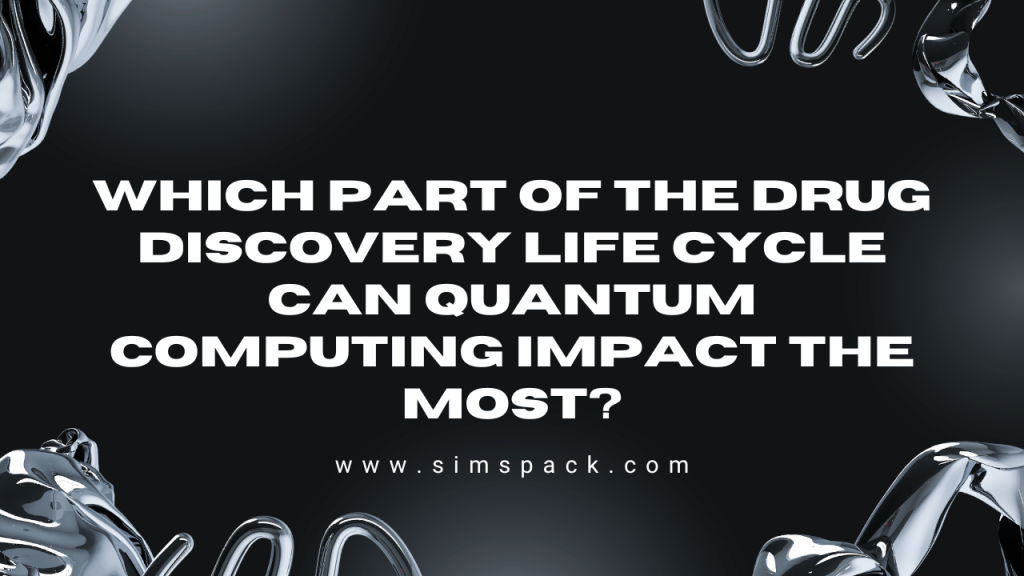Quantum computing, the frontier of advanced computational technology, holds immense potential for various fields, including drug discovery and development. This article will delve into the incredible possibilities that which part of the drug discovery life cycle can quantum computing impact the most?
What is Quantum Computing?
Quantum computing is a cutting-edge field that harnesses the principles of quantum mechanics to process information. Unlike classical computers that use binary bits (0 or 1), quantum computers employ quantum bits, or qubits, which can represent both 0 and 1 simultaneously, thanks to the superposition principle of quantum physics. This unparalleled computational capacity of quantum computing paves the way for massive advancements in complex problem-solving scenarios such as drug discovery.
Quantum Computing in Drug Discovery: A Game-changer
Drug discovery is a multifaceted process that starts with target identification, followed by hit discovery and lead optimization, preclinical and clinical trials, and finally, regulatory approval. Among these stages, quantum computing has the highest impact potential in drug design and optimization, dramatically enhancing speed, efficiency, and accuracy.
Quantum-Assisted Drug Target Identification
Drug target identification involves finding suitable biological targets, such as proteins or genes, that drugs can interact with to treat a disease. Quantum computing can enhance this process by helping scientists simulate and analyze complex biological systems, thereby identifying potential drug targets faster and more accurately.
Quantum-Enhanced Drug Screening
Once potential targets are identified, researchers screen millions of compounds to find a ‘hit’ – a compound that can interact with the target effectively. Here, quantum computing can supercharge high-throughput screening, reducing the computational time and resources required to scan vast chemical libraries.
Quantum Computing for Molecular Modeling and Optimization
The most profound impact of quantum computing lies in drug design and optimization. By leveraging quantum computational chemistry, researchers can model and simulate the behavior of molecules at the quantum level. This allows for the development of more effective, targeted drugs, as well as the optimization of existing drug molecules.
Quantum Machine Learning in Drug Discovery

Quantum machine learning, an exciting subfield of quantum computing, combines quantum algorithms with machine learning techniques, potentially revolutionizing drug discovery. It can significantly enhance data analysis, pattern recognition, and prediction models, making the drug discovery process more streamlined and precise.
Quantum Computing: Pioneering Personalized Medicine
Quantum computing opens up a new world of possibilities for personalized medicine, a revolutionary approach that tailors treatments based on an individual’s genetic makeup. By analyzing vast genomic data and simulating numerous molecular interactions, quantum computers could help design personalized drugs and treatment plans, taking healthcare into a new era.
Quantum-Enhanced Virtual Screening
With quantum computing, virtual screening – a technique used to predict how a compound will interact with a biological target – can be significantly improved. Quantum-enhanced virtual screening can speed up the process and deliver more accurate results, saving precious time and resources in drug discovery.
Quantum Computing: Challenges and Future Perspectives
Despite its immense potential, the application of quantum computing in drug discovery is still in its nascent stage. Challenges like quantum decoherence, error correction, and the need for extremely low temperatures for qubit stability persist. However, ongoing research and technological advancements hint at a promising future, where quantum computers could become an invaluable tool in the drug discovery toolbox.
Decoding Quantum Algorithms for Drug Discovery
Quantum algorithms are mathematical recipes executed by quantum computers. In drug discovery, they can execute numerous tasks faster and more accurately than classical algorithms. Some well-known quantum algorithms that could revolutionize the field are the Quantum Approximate Optimization Algorithm (QAOA), Variational Quantum Eigensolver (VQE), and Quantum Phase Estimation (QPE) algorithm.
Quantum Approximate Optimization Algorithm (QAOA)
QAOA is a versatile quantum algorithm that can solve a wide range of optimization problems, such as finding the optimal configuration of atoms in a drug molecule. By doing so, it can aid in optimizing drug molecules to increase their efficacy and reduce potential side effects.
Variational Quantum Eigensolver (VQE)
VQE is a quantum algorithm designed to find the lowest energy state, or ground state, of a quantum system. In drug discovery, VQE can predict the most stable conformation of a drug molecule, which is critical for understanding its biological activity and therapeutic potential.
Quantum Phase Estimation (QPE)
QPE is a central algorithm in quantum computing used to estimate the eigenvalues of a unitary operator. In drug discovery, QPE can accelerate the process of understanding drug-target interactions by offering precise estimations of transition states and reaction rates.
The Promise of Quantum Computational Chemistry in Drug Development
Chemistry, at its core, is quantum mechanical. Therefore, using quantum computing to simulate chemical reactions can deliver unprecedented precision. Quantum computational chemistry can explore vast chemical spaces more efficiently and accurately, helping researchers discover novel drugs and optimize existing ones.
Quantum Simulations of Biological Systems
Quantum simulations can accurately model and analyze complex biological systems, offering valuable insights into drug-target interactions. These simulations can help researchers better understand diseases at the molecular level and develop more effective therapeutic strategies.
Quantum Computing for Drug Potency Prediction
One of the most crucial aspects of drug development is determining the potency of a drug, i.e., its ability to produce a therapeutic effect. Quantum computing can provide a more accurate prediction of drug potency by simulating molecular interactions at the quantum level. This could lead to the development of more effective drugs and reduce the time and resources required for clinical trials.
Quantum Algorithms for High-Throughput Screening
High-throughput screening (HTS) is a method used to test thousands of compounds quickly for potential drug candidates. However, the immense computational resources required for HTS pose a significant challenge. Quantum computing, with its exponential processing power, could dramatically accelerate HTS, making it more feasible and cost-effective.
Quantum Computing in Personalized Medicine: A Future Perspective
Personalized medicine aims to tailor treatments to individual patients based on their genetic and biochemical makeup. Quantum computing could take personalized medicine to the next level by allowing for the simulation and analysis of individual genomic data and drug responses at an unprecedented scale. This could lead to the design of personalized treatment plans and drugs, heralding a new era in healthcare.
Quantum-Enhanced Virtual Screening: A Leap Forward
Virtual screening is a computer-aided technique used in drug discovery to search libraries of compounds for those most likely to bind to a drug target. However, it can be time-consuming and resource-intensive. Quantum-enhanced virtual screening could offer a significant improvement in speed and accuracy, dramatically accelerating the drug discovery process.
Frequently Asked Questions About Which Part of the Drug Discovery Life Cycle can Quantum Computing Impact the Most?
Q: How does Quantum Approximate Optimization Algorithm (QAOA) contribute to drug discovery?
A: The QAOA can solve complex optimization problems, such as finding the optimal configuration of atoms in a drug molecule, which can increase its efficacy and reduce potential side effects.
Q: Can Variational Quantum Eigensolver (VQE) aid in drug development?
A: Yes, the VQE algorithm can predict the most stable conformation of a drug molecule, crucial for understanding its biological activity and therapeutic potential.
Q: How can quantum simulations benefit drug discovery?
A: Quantum simulations can accurately model and analyze complex biological systems, offering valuable insights into drug-target interactions and the development of more effective therapeutic strategies.
Q: What role can quantum computing play in personalized medicine?
A: By allowing for the simulation and analysis of individual genomic data and drug responses, quantum computing could help design personalized treatment plans and drugs, potentially revolutionizing the field of personalized medicine.
Q: How can quantum-enhanced virtual screening accelerate drug discovery?
A: Quantum-enhanced virtual screening could significantly improve the speed and accuracy of searching libraries of compounds for potential drug candidates, thus accelerating the drug discovery process.
Q: How can quantum computing improve drug discovery?
A: Quantum computing can significantly enhance drug discovery by speeding up and increasing the accuracy of processes like target identification, high-throughput screening, molecular modeling, and drug optimization.
Q: Can quantum computational chemistry revolutionize drug development?
A: Yes, by simulating molecules’ behavior at the quantum level, quantum computational chemistry can potentially revolutionize drug development, leading to the creation of more effective and targeted drugs.
Q: What role does quantum chemistry play in pharmacology?
A: Quantum chemistry can help simulate and understand complex molecular interactions at a quantum level, which is crucial for drug development and optimization.
Q: Are there any successful examples of using quantum computing in drug screening?
A: While quantum computing in drug discovery is still in early stages, there are several ongoing research efforts aiming to leverage this technology for improved drug screening.
Q: What potential does quantum computing have in personalized medicine and drug customization?
A: By processing vast amounts of genomic data and simulating myriad molecular interactions, quantum computers could help design personalized drugs and treatment plans, thus pioneering a new era in healthcare.
Also Read: How Long Can Someone Leave Their Belongings on Your Property?
Conclusion: The Quantum Frontier in Drug Discovery
Quantum computing holds the promise to revolutionize drug discovery, offering new pathways to drug design, optimization, and personalized medicine. Although the field is still in its infancy, the potential of quantum computing is immense. As we overcome current technical challenges and gain a deeper understanding of quantum mechanics, we will undoubtedly witness a quantum leap in drug discovery. The quantum era is upon us, and it promises a future of rapid, accurate, and personalized drug discovery.
As we draw to a close, we sincerely hope that this article has served as a valuable reference, assisting you in unraveling the complexities and nuances surrounding the topic of “Which Part of the Drug Discovery Life Cycle can Quantum Computing Impact the Most?”




